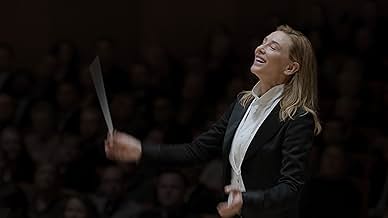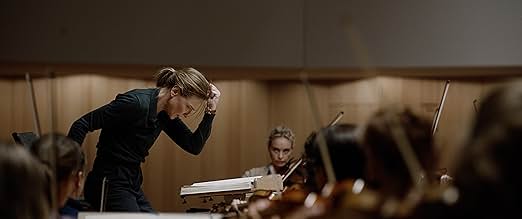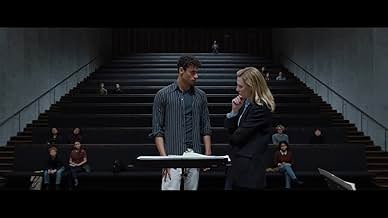Lydia Tár es considerada como una de las más grandes compositoras-directoras vivas y primera mujer directora de música de una gran orquesta alemana.Lydia Tár es considerada como una de las más grandes compositoras-directoras vivas y primera mujer directora de música de una gran orquesta alemana.Lydia Tár es considerada como una de las más grandes compositoras-directoras vivas y primera mujer directora de música de una gran orquesta alemana.
- Dirección
- Guionista
- Elenco
- Nominado a 6 premios Óscar
- 79 premios ganados y 271 nominaciones en total
Zethphan D. Smith-Gneist
- Max
- (as Zethphan Smith-Gneist)
- Dirección
- Guionista
- Todo el elenco y el equipo
- Producción, taquilla y más en IMDbPro
Opiniones destacadas
Everybody writing about this mock biopic focuses on Cate Blanchett's knock-it-out-of-the-park performance, but when compared to Field's "Little Children" (2006), "Tár" lacks the storytelling and editing skills which make the earlier film a masterpiece of human relations, whereas the latter is an interesting character study that somehow collapses under its own weight.
There's a strong establishing scene showing Tár demolishing an aspiring musician's conceited views on Bach, yet one has to wait for a long time for a follow-up showing the main character's boundary issues. The central topic emerges rather quickly (abuse of power), but there are diversions which support character development, yet drag on the narrative, which is probably why many reviews here find the film frustrating.
Being an ex-Berliner, I like the fact that the city is being used as a real location as opposed to the usual tourist / Cold War hot spots, and the Philharmonics rehearsal scenes are very well done, but they don't really push the story forward and could have easily been wound down a bit.
Nina Hoss as Tár's partner is a brilliant counterpoint, because she keeps a good deal of her thoughts to herself until she doesn't, so more focus on their relationship would have helped the story. Hoss would deserve a supporting actress Academy Award nod if only she had more screen time.
The initial scene of conflict eventually loops back into focus, and Field could have used this to explore societal misjudgment as he did in "Little Children" - but he doesn't, which makes "Tár" rather distant and cold. Field expects viewers to interpret a lot on their own, which is bold and demanding, but with this approach it is crucial to keep focus on an underlying message, otherwise it gets lost.
In conclusion, "Tár" has all the ingredients for a masterpiece - interesting characters, great performances, nice camerawork - but weak storytelling ultimately reduces the film's potential.
There's a strong establishing scene showing Tár demolishing an aspiring musician's conceited views on Bach, yet one has to wait for a long time for a follow-up showing the main character's boundary issues. The central topic emerges rather quickly (abuse of power), but there are diversions which support character development, yet drag on the narrative, which is probably why many reviews here find the film frustrating.
Being an ex-Berliner, I like the fact that the city is being used as a real location as opposed to the usual tourist / Cold War hot spots, and the Philharmonics rehearsal scenes are very well done, but they don't really push the story forward and could have easily been wound down a bit.
Nina Hoss as Tár's partner is a brilliant counterpoint, because she keeps a good deal of her thoughts to herself until she doesn't, so more focus on their relationship would have helped the story. Hoss would deserve a supporting actress Academy Award nod if only she had more screen time.
The initial scene of conflict eventually loops back into focus, and Field could have used this to explore societal misjudgment as he did in "Little Children" - but he doesn't, which makes "Tár" rather distant and cold. Field expects viewers to interpret a lot on their own, which is bold and demanding, but with this approach it is crucial to keep focus on an underlying message, otherwise it gets lost.
In conclusion, "Tár" has all the ingredients for a masterpiece - interesting characters, great performances, nice camerawork - but weak storytelling ultimately reduces the film's potential.
If you are not familiar with classical music, probably almost the entire first hour will be very difficult to sit through. The dialogue is PACKED with references to classical music artists/works/history/etc. Not to mention there are constant little allusions to different plot threads which make up Tar's whole story.
However, this dies down gradually and the movie becomes much more focused and simple. Blanchett is incredible, but not in a showy way at all. Her conducting moments were awesome. The story is political and relevant, and handled very well and balanced-like.
There is a surprisingly creepy vibe to the film, that borders on something almost like a horror movie at times. It's quite unnerving.
One of the best movies i've seen all year! Probably Todd Field's best work yet.
However, this dies down gradually and the movie becomes much more focused and simple. Blanchett is incredible, but not in a showy way at all. Her conducting moments were awesome. The story is political and relevant, and handled very well and balanced-like.
There is a surprisingly creepy vibe to the film, that borders on something almost like a horror movie at times. It's quite unnerving.
One of the best movies i've seen all year! Probably Todd Field's best work yet.
During the first minute of this film, Cate Blanchett shows what an extraordinary actress she is. Her character, star conductor Lydia Tár, is waiting to go onstage. There is no dialogue, only body language. But even without words, Blanchett shows what Tár thinks and feels.
Blanchett's remarkable performance is a large part of what makes this a good movie. But there's more. The very clever script gives us a lot to chew on afterards. Tár is a woman in the men-dominated world of classical music. She's not warm, empathic or even very sympathetic. In fact, she has many characteristics that are usually associated with men. She's vain, selfish and manipulative. And that's what gets her in trouble. At the start of the film, she seems to be one of the most admired women in the world. She is extremely famous and successful. At the end, everything has fallen apart.
The film doesn't judge. It leaves it up to the viewer to decide if Lydia Tár is a victim or a culprit. Or maybe both at the same time. The viewer gets a lot of information to make up his (or her) mind. Director Todd Field gives us the story elements slowly, bit by bit. Take the scene where Lydia Tár gives a stern speech to a young girl who bullies her daughter. It shows that she is used to getting everyone in line, according to her wishes. That's useful information to interpret things later on in the movie.
Tár is very much a modern movie. It has things to say about gender, about power, about social media, about being woke. But at the same time, it's a very old-fashioned movie. It takes its time. There are long scenes, and long takes. There's nothing modern in the way it is filmed. And that's a good thing.
Blanchett's remarkable performance is a large part of what makes this a good movie. But there's more. The very clever script gives us a lot to chew on afterards. Tár is a woman in the men-dominated world of classical music. She's not warm, empathic or even very sympathetic. In fact, she has many characteristics that are usually associated with men. She's vain, selfish and manipulative. And that's what gets her in trouble. At the start of the film, she seems to be one of the most admired women in the world. She is extremely famous and successful. At the end, everything has fallen apart.
The film doesn't judge. It leaves it up to the viewer to decide if Lydia Tár is a victim or a culprit. Or maybe both at the same time. The viewer gets a lot of information to make up his (or her) mind. Director Todd Field gives us the story elements slowly, bit by bit. Take the scene where Lydia Tár gives a stern speech to a young girl who bullies her daughter. It shows that she is used to getting everyone in line, according to her wishes. That's useful information to interpret things later on in the movie.
Tár is very much a modern movie. It has things to say about gender, about power, about social media, about being woke. But at the same time, it's a very old-fashioned movie. It takes its time. There are long scenes, and long takes. There's nothing modern in the way it is filmed. And that's a good thing.
For every era of cinematic history, there are the films that decades later people look at them as the ones that showed a period in time for how it was. Tar will be remembered as one of the movies that defined the early 2020s. It's a complex character study that refuses to take a side, one that shows a deeply complicated person for who she is. This is a downfall story (you can see why Scorsese called it his favorite movie of the year), in which highly successful composer/conductor Lydia Tar falls from grace after allegations (that may or may not be true) emerge that she had a sexual relationship with a student, Krista Taylor, that ended in her suicide. It's an intensely psychological film, with a thin line between what is literally and not literally happening.
An intense character study by definition needs to be driven by a strong performance, and Cate Blanchett delivers not only the best performance of her career, but also the best performance of the year. Every part of her masterful performance is believable. At times she does not seem like a movie character as much as a real person whose life is being broadcast. She is equal parts powerful yet vulnerable, imposing yet fragile, villain yet victim. Blanchett humanizes Lydia Tar and all of her faults in a way that very few completely fictional movie characters are.
Tar is a film driven by well-handled juxtapositions. The primary example (as well as the most successful) is the aforementioned aspects of Lydia Tar's character. The setting of present day Berlin adds to the juxtaposition. It's one of Europe's premier cultural cities, but yet the aesthetic of the film turns it into a claustrophobic, lifeless prison. Even the concert hall of the Berlin Philharmonic, one of the most important venues in classical music, feels limiting. And then, of course, there's the ending. All I'll say is that it took us gamers by surprise.
It is perhaps unexpected for a movie that takes aim at cancel culture to gain traction in the way that Tar did. At a time when people fall in line with hiveminds and nuance is nonexistent, Tar is a movie that shows the deep complications of the human condition, where no one is all good, and no one is all bad. This is a distinctly contemporary aspect that adds a new layer to the classic downfall story, a character arc that has been told for millennia. The corrupting nature of power never changes; Citizen Kane is as relevant now as it was in 1941. The message here is clear: power corrupts not only the individual, but the masses as well.
One of the best things about Tar is the power of what is not shown. Krista Taylor's face does not appear on screen even once. Her voice is never heard either. She is the downfall of Lydia Tar and one of the most important characters in the movie and is completely invisible, and it works perfectly well. This aids the unbiased look at Lydia, by blocking any possibility of our own biases being affected by Krista as a character. Mahler's music is the perfect choice for this movie, as he was one of the great composers of the Romantic era, and is very emotionally driven, especially that 5th Symphony.
In a few decades, people will still be talking about Tar. People will associate Tar with the 2020s the same way they associate Taxi Driver with 1970s urban America, or even Caligari to the Weimar Republic. It will be a window into today's world for future generations. It's a great film back by a fantastic performance that handles its subject matter very well. This is the best film of 2022.
An intense character study by definition needs to be driven by a strong performance, and Cate Blanchett delivers not only the best performance of her career, but also the best performance of the year. Every part of her masterful performance is believable. At times she does not seem like a movie character as much as a real person whose life is being broadcast. She is equal parts powerful yet vulnerable, imposing yet fragile, villain yet victim. Blanchett humanizes Lydia Tar and all of her faults in a way that very few completely fictional movie characters are.
Tar is a film driven by well-handled juxtapositions. The primary example (as well as the most successful) is the aforementioned aspects of Lydia Tar's character. The setting of present day Berlin adds to the juxtaposition. It's one of Europe's premier cultural cities, but yet the aesthetic of the film turns it into a claustrophobic, lifeless prison. Even the concert hall of the Berlin Philharmonic, one of the most important venues in classical music, feels limiting. And then, of course, there's the ending. All I'll say is that it took us gamers by surprise.
It is perhaps unexpected for a movie that takes aim at cancel culture to gain traction in the way that Tar did. At a time when people fall in line with hiveminds and nuance is nonexistent, Tar is a movie that shows the deep complications of the human condition, where no one is all good, and no one is all bad. This is a distinctly contemporary aspect that adds a new layer to the classic downfall story, a character arc that has been told for millennia. The corrupting nature of power never changes; Citizen Kane is as relevant now as it was in 1941. The message here is clear: power corrupts not only the individual, but the masses as well.
One of the best things about Tar is the power of what is not shown. Krista Taylor's face does not appear on screen even once. Her voice is never heard either. She is the downfall of Lydia Tar and one of the most important characters in the movie and is completely invisible, and it works perfectly well. This aids the unbiased look at Lydia, by blocking any possibility of our own biases being affected by Krista as a character. Mahler's music is the perfect choice for this movie, as he was one of the great composers of the Romantic era, and is very emotionally driven, especially that 5th Symphony.
In a few decades, people will still be talking about Tar. People will associate Tar with the 2020s the same way they associate Taxi Driver with 1970s urban America, or even Caligari to the Weimar Republic. It will be a window into today's world for future generations. It's a great film back by a fantastic performance that handles its subject matter very well. This is the best film of 2022.
Initially I was put off by Tár-it's cryptic, drab, and sluggish. Until I realized what the filmmakers were actually accomplishing. No spoilers in this review, but to enjoy the film you have to know certain things:
1. Yes, Cate Blanchett is fantastic and rightfully deserves the accolades.
2. The film is the slowest of slow burns.
3. The film does not hold your hand.
4. The film's narrative cuts out key elements of scenes that other filmmakers would have highlighted. This was the sticking point for me-it didn't dawn on me until halfway through the film what was happening. If you know this going in, I believe you'll have a better experience with the film. The film purposefully *doesn't* show you the "important" elements of scenes or relationships between characters. You have to figure that out yourself, just like putting together the puzzle of who Lydia Tár actually is. Here's a quick non-related example:
Bill stared at the smoke in the frying pan.
Bill rubbed his nose five times and took a call from Ernest while sipping coffee at Station 271.
If those two sentences above were in a book, it would be leaving out major plot points that other authors would have filled in. First, there was a fire in Bill's kitchen. He called the fire department. He had to evacuate, so the fire may have been bad. And who is Ernest, if we have not been introduced to that character before? Why is bill rubbing his nose so much? Is it a tick or OCD or nervous habit?
That's what Tár is like. It presents to you all the items "between the lines" and lets you solve for X for yourself. Once I understood that that was the dominant cinematic approach in this film, it became immensely more enjoyable...and challenging. Very much worth your time if you put in the effort.
1. Yes, Cate Blanchett is fantastic and rightfully deserves the accolades.
2. The film is the slowest of slow burns.
3. The film does not hold your hand.
4. The film's narrative cuts out key elements of scenes that other filmmakers would have highlighted. This was the sticking point for me-it didn't dawn on me until halfway through the film what was happening. If you know this going in, I believe you'll have a better experience with the film. The film purposefully *doesn't* show you the "important" elements of scenes or relationships between characters. You have to figure that out yourself, just like putting together the puzzle of who Lydia Tár actually is. Here's a quick non-related example:
Bill stared at the smoke in the frying pan.
Bill rubbed his nose five times and took a call from Ernest while sipping coffee at Station 271.
If those two sentences above were in a book, it would be leaving out major plot points that other authors would have filled in. First, there was a fire in Bill's kitchen. He called the fire department. He had to evacuate, so the fire may have been bad. And who is Ernest, if we have not been introduced to that character before? Why is bill rubbing his nose so much? Is it a tick or OCD or nervous habit?
That's what Tár is like. It presents to you all the items "between the lines" and lets you solve for X for yourself. Once I understood that that was the dominant cinematic approach in this film, it became immensely more enjoyable...and challenging. Very much worth your time if you put in the effort.
¿Sabías que…?
- TriviaProfessional cellist Sophie Kauer had no prior acting experience and auditioned at the encouragement of a friend. She learned to act by watching YouTube tutorials hosted by Michael Caine.
- ErroresWhen Lydia is talking to the two technicians after a rehearsal in Berlin, she requests they send her audio and video recordings, but the console in front of them in the booth is actually for controlling lights, not audio/video.
- Créditos curiososThe opening credits presents the film crew and acknowledgments (usually shown at the end titles) without presenting the actors. The actors and soundtrack are shown at the ending without the crew.
- ConexionesEdited from El proyecto de la bruja de Blair (1999)
- Bandas sonorasDas Wohltemperierte Klavier: Präludium and Fuge C-Dur, BWV 846
Written by Johann Sebastian Bach
Piano, Cate Blanchett
Selecciones populares
Inicia sesión para calificar y agrega a la lista de videos para obtener recomendaciones personalizadas
- How long is Tár?Con tecnología de Alexa
Detalles
- Fecha de lanzamiento
- País de origen
- Sitios oficiales
- Idiomas
- También se conoce como
- Tar
- Locaciones de filmación
- Dresde, Sajonia, Alemania(Kulturpalast & Großen Garten Platz)
- Productoras
- Ver más créditos de la compañía en IMDbPro
Taquilla
- Presupuesto
- USD 25,000,000 (estimado)
- Total en EE. UU. y Canadá
- USD 6,773,650
- Fin de semana de estreno en EE. UU. y Canadá
- USD 158,620
- 9 oct 2022
- Total a nivel mundial
- USD 29,177,163
- Tiempo de ejecución
- 2h 38min(158 min)
- Color
- Mezcla de sonido
- Relación de aspecto
- 2.39 : 1
Contribuir a esta página
Sugiere una edición o agrega el contenido que falta



































